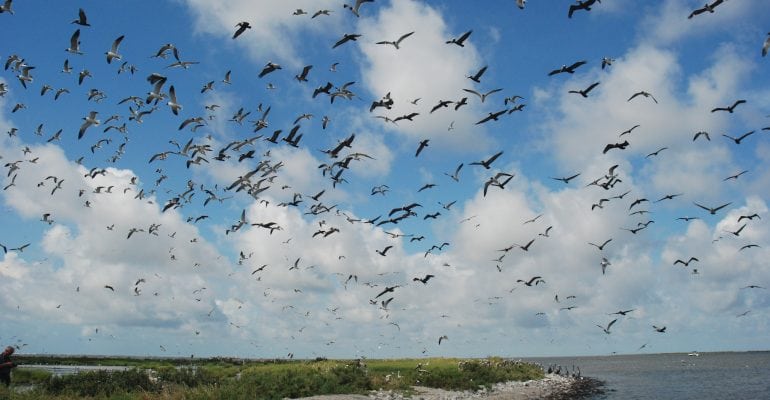The Louisiana Wildlife and Fisheries Commission recently passed a resolution in response to the impacts of 2019 floodwaters on Louisiana’s fisheries. Water levels are expected to qualify this event as the longest flood fight in the state’s history.
The resolution described the severity of the flood event and requested LDWF to continue to document the impacts of the flood on Louisiana’s commercial and recreational fisheries. It also affirms the Commission’s support of Governor John Bel Edwards’ recent request to the U.S. Department of Commerce for a federal fisheries disaster declaration.
“Our commercial and recreational fisheries are being severely impacted by this flood. All parts of these important industries, from fishermen to processors to marinas to the very communities along our coast, are feeling the impacts,” said Commission Chairman Al Sunseri. “It is important that the impacts are well-documented so that our congressional delegation can assist us in our efforts to secure disaster funding necessary to help rehabilitate fisheries resources and the people dependent upon them.”
These historic high river levels come with an unprecedented influx of freshwater into our coastal areas, and statewide biological sampling indicates a notable reduction in the availability of crabs, shrimp, oysters, and finfish. LDWF plans to continue its monitoring efforts to collect, analyze, and share data.
(Preliminary sampling results as of June 28, 2019, are available here.)
A letter from Gov. Edwards’s office was submitted in June to the National Oceanic and Atmospheric Administration Fisheries and the U.S. Department of Commerce requesting a declaration of a fisheries disaster in Louisiana, asking Congress to authorize and appropriate funds to recover fisheries disaster loss.
His letter cited specific impact examples to support the request. It is important to note that the request represents all fishing sectors, all commercially- and recreationally-important species, and all sections of the coast. LDWF biological sampling and fisheries landings (harvest levels) will be utilized to determine the severity of impacts and if such impacts reach the federal threshold for declaring a disaster. To be considered for a fisheries disaster declaration, economic and/or fisheries resource losses must reach 35 percent over a 12-month period as compared to the most recent five-year average.
Given that the extent of damages to Louisiana’s fisheries cannot be fully determined until floodwaters recede and a 12-month evaluation can be completed, LDWF cautions against any premature assessment. LDWF will continue to collect the data to support the Governor’s federal fisheries disaster declaration request. Once the required data analysis is completed it will be submitted to NOAA for its inspection.
The Louisiana Department of Wildlife and Fisheries is charged with managing and protecting Louisiana’s abundant natural resources. For more information, visit us atwww.wlf.la.gov. To receive email alerts, signup at http://www.wlf.la.gov/signup.




